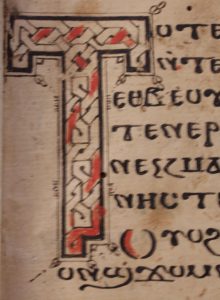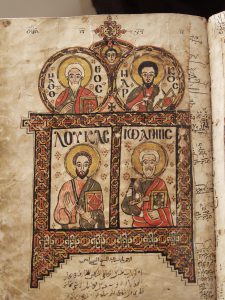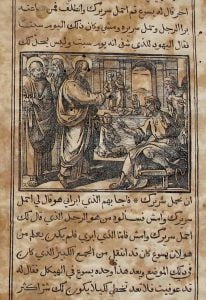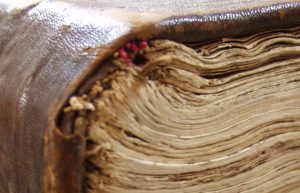




The Levantine Foundation
The Levantine Foundation is a charity registered in England and the Arab Republic of Egypt, whose aim is to record and preserve cultural heritage on paper and related materials in the Near East through expertise, education, and dissemination of knowledge.
The Foundation is grateful to The British Council’s Cultural Protection Fund in Partnership with the Department for Digital, Culture, Media & Sport for the ongoing grants awarded for 2019-21.


The Levantine Foundation is a non political registered charity founded in the UK in 2002 and in the Arab Republic of Egypt where it received NGO status in 2007, under Law no. 84 (2002). The registered office in England: 106 St. George’s Square, London SW1V 3QY The Foundation works to preserve Near Eastern historical documents on paper and parchment, and to disseminate their hugely important cultural content to a broader public. The Foundation also organises and assists in the provision of lectures, courses of instructions and educational activities with a view to promoting cultural heritage preservation. Since its inception, The Levantine Foundation has been preserving and cataloguing the unique collection of Christian manuscripts from the library of Deir Al-Surian Monastery, conserving numerous codices and individual manuscripts ,The large number of manuscripts and fragments in Deir Al-Surian represents an inheritance of inestimable cultural and scholarly value and form an essential part of the cultural heritage for the world. From 2007, the Foundation led the construction of the new state of the art library building, completed in 2012, where the collection was rehoused in 2013. To ensure cost efficiency and to reduce administrative expenses the Foundation works with experts and scholars employed for specific projects only or with those who offer their expertise free of charge.
مؤسسة ليفانتين هي مؤسسة خيرية مسجلة غير سياسية تأسست في المملكة المتحدة في عام 2002 وفي جمهورية مصر العربية حيث حصلت على وضع المنظمات غير الحكومية في عام 2007 ، بموجب القانون رقم. 84 (2002). المكتب المسجل في إنجلترا: 106 شارع سانت جورج ، لندن SW1V 3QY تعمل المؤسسة على الحفاظ على الوثائق التاريخية الخاصة بالشرق الأدنى على الورق والرق، ونشر المحتوى الثقافي المهم للغاية على جمهور أوسع. تقوم المؤسسة أيضاً بالتنظيم والمساعدة على تأمين المحاضرات ودورة التعليمات والأنشطة التعليمية بهدف تعزيز الحفاظ على التراث الثقافي. منذ تأسيسها ، تقوم مؤسسة ليفانتين بحفظ وتصنيف المجموعة الفريدة من المخطوطات المسيحية من مكتبة دير السريان، مع الحفاظ على العديد من المخطوطات، يمثل العدد الكبير من المخطوطات في دير السريان ميراثاً ذا قيمة ثقافية وعلمية لا تقدر بثمن ويشكل جزءاً أساسياً من التراث الثقافي للعالم. من عام 2007 ، قادت المؤسسة بناء مبنى مكتبة الفن الجديد للدولة، الذي تم الانتهاء منه في عام 2012، حيث تم إعادة بناء المجموعة في عام 2013. لضمان فعالية التكلفة وخفض النفقات الإدارية ، تعمل المؤسسة مع الخبراء والباحثين العاملين في مشاريع محددة فقط أو مع أولئك الذين يقدمون خبراتهم مجاناً
Preservation & Conservation
The Foundation’s most important project is to secure the future of the manuscripts in the Deir al-Surian Library.
In the eighteenth and nineteenth centuries a great quantity of Deir al-Surian manuscripts were taken to Europe and are, today, held in several important collections, including the British Library and the Vatican Library. The large number of manuscripts and fragments that remain in the monastery represent an inheritance of inestimable scholarly value and remain an essential part of the heritage of the entire Christian world.
However, after fifteen hundred years in the environment of a living monastic community, many of the manuscripts are in a parlous state and continue to deteriorate, placing their very existence at risk.
During recent times there has been a revival of the Coptic monasteries in Egypt. The Deir al-Surian community now numbers over two hundred monks, and a new, committed and educated generation is determined to preserve this unique inheritance, in situ, for future generations.
In order to achieve this goal, Elizabeth Sobczynski, a conservation consultant working with major museums in London, founded The Levantine Foundation in 2002, which has, in the intervening years:
- Surveyed the collection and conserved over one hundred codices, in addition to three hundred fragments and singular manuscripts
- Built and opened, in 2013, a new library with modern storage and lecture facilities, including reading rooms, allowing access to the collection
- Created an on-site conservation laboratory
- Worked to educate the monks and the local secular community
- Funded, in 2014, the cataloguing of the Syriac manuscripts by Sebastian Brock of the University of Oxford and Lucas van Rompay of Duke University in the United States
- Catalogued, between 2016 and 2019, the Ethiopic manuscripts within the frames of the BETA MASAHEFT project, of the Hiob Ludolf Centre for Ethiopic Studies, Hamburg University
However, the work remains pressing and the ongoing projects include:
- The digital recording and documenting of the collection to ensure its continuing survival and to facilitate access for scholars without continual handling.
- Conservation of the most important manuscripts
- Training of monks in collection care and record-keeping
- Training monks from other libraries and educating local people
- Cataloguing of the Coptic and Arabic manuscripts




